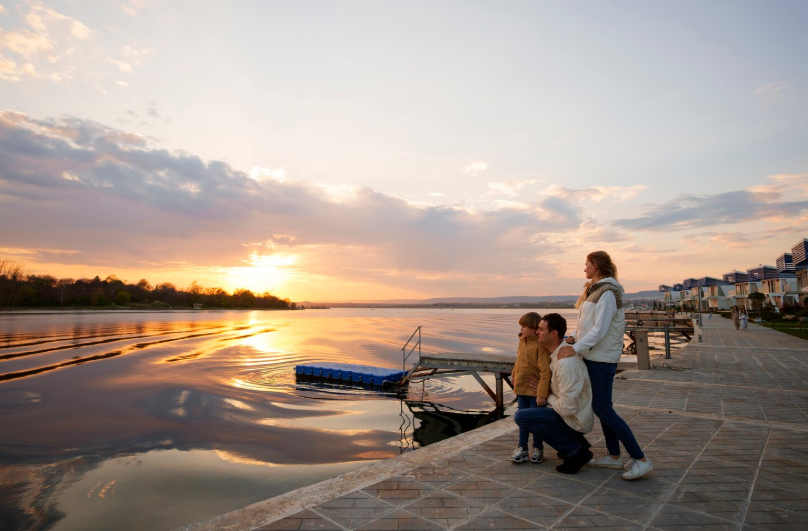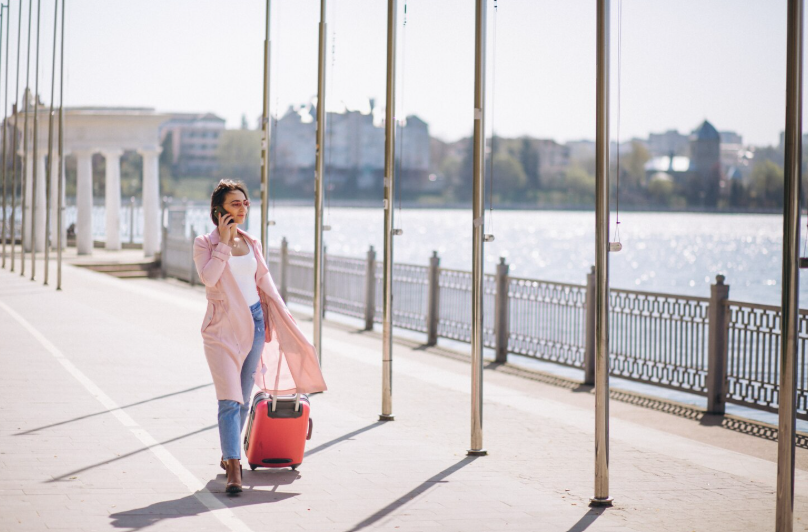
by Dulce Navarro | Feb 3, 2026 | Europe, Experiences, Lifestyle, Luxury, Travel
Paris Through a Softer Lens: Subtle Experiences for Elegant Travelers
Paris has long been portrayed through grand images: the Eiffel Tower shimmering at night, the Champs-Élysées illuminated with luxury storefronts, and the Louvre crowned by its iconic glass pyramid. While these landmarks deserve their reputation, the true elegance of Paris often lies in its quieter corners — in experiences that unfold gently rather than announce themselves loudly.
For the cultivated traveler, refinement is found not in spectacle but in nuance. To see Paris through a softer lens is to appreciate its understated rituals, its architectural harmony, and its deeply rooted cultural rhythms. Beyond the grand boulevards, the city reveals a more intimate sophistication — one that rewards patience, curiosity, and discernment.
Morning Light Along the Seine
Few experiences capture Parisian elegance more authentically than an early morning walk along the Seine. Before the city fully awakens, the river reflects soft hues of lavender and gold, and the embankments remain blissfully calm. Booksellers arrange their vintage prints and rare editions, joggers pass quietly, and the distant bells of historic churches punctuate the stillness.
This is a Paris without performance. The absence of crowds allows space for contemplation. The bridges — Pont Alexandre III, Pont Neuf, Pont des Arts — become architectural studies rather than photo backdrops. For the elegant traveler, such moments offer a connection to the city that feels personal and unfiltered.
The Art of the Unhurried Café
Parisian café culture is often imitated but rarely replicated. The key is not simply ordering an espresso; it is embracing the ritual. In neighborhoods like Saint-Germain-des-Prés or the Upper Marais, smaller cafés preserve the tradition of conversation, reflection, and observation.
An unhurried afternoon at a corner café, with a well-bound book or thoughtful discussion, reflects a distinctly Parisian approach to time. There is refinement in restraint — in allowing the day to unfold naturally rather than rushing from attraction to attraction. True luxury here is measured in presence, not extravagance.
Private Moments in World-Class Museums
While the Louvre and Musée d’Orsay attract global attention, the refined traveler seeks depth over breadth. Smaller institutions such as the Musée Jacquemart-André, Musée Marmottan Monet, or Musée Rodin offer immersive experiences without overwhelming scale.
Within these quieter galleries, one can study brushstrokes and sculpture details without distraction. The Musée Marmottan’s collection of Monet works, for example, provides a profound exploration of Impressionism in an intimate setting. The elegance lies in contemplation — engaging with art not as a checklist item, but as a dialogue across centuries.
Architectural Harmony in Residential Arrondissements
Paris is often described as a museum of architecture, yet its residential neighborhoods reveal a softer grandeur. The 7th, 16th, and parts of the 5th arrondissement showcase Haussmannian facades, wrought-iron balconies, and limestone symmetry that define the city’s visual coherence.
Walking these streets in the late afternoon, as sunlight grazes stone buildings, reveals the deliberate urban planning that makes Paris uniquely harmonious. The elegance is structural — embedded in proportion, material, and preservation. It is a reminder that refinement is not accidental but thoughtfully maintained.
Hidden Gardens and Interior Courtyards
Beyond the famed Jardin du Luxembourg and Tuileries lies a network of hidden green spaces. Square des Batignolles, Jardin des Plantes’ quieter corners, and discreet courtyard gardens tucked behind carriage entrances offer tranquility amid urban energy.
Many historic hôtels particuliers conceal interior courtyards accessible through modest archways. Stepping into one feels like entering another era. These secluded spaces represent Paris at its most intimate — a city that rewards those willing to look beyond the obvious.
The Elegance of Independent Boutiques
Luxury in Paris is not confined to flagship stores on Avenue Montaigne. True connoisseurs explore independent ateliers and heritage maisons where craftsmanship remains central. From bespoke perfumeries in the Palais Royal arcades to artisanal leather workshops in the Marais, the city continues to value artistry over mass production.
Engaging directly with artisans provides insight into techniques passed down through generations. Such encounters reflect a deeper appreciation for quality and authenticity — hallmarks of enduring elegance.
Evening Conversations and Cultural Salons
As evening descends, Paris transitions gracefully. Rather than grand spectacles, refined experiences often involve intimate cultural gatherings — chamber music performances, literary talks, or gallery openings in understated spaces.
The city’s intellectual heritage remains vibrant. Conversations about philosophy, art, politics, and literature continue to shape its identity. Participating in these quieter cultural moments allows travelers to connect with Paris not merely as observers, but as engaged participants in its living tradition.
Culinary Precision Without Excess
Parisian gastronomy extends far beyond Michelin-starred dining rooms. While haute cuisine retains its prestige, neighborhood bistros and chef-driven wine bars frequently offer equally refined experiences grounded in seasonal ingredients and precise technique.
Elegance on the plate is often expressed through simplicity — a perfectly roasted fish, a delicate tarte fine, or a thoughtfully curated cheese selection. Paired with understated service and carefully chosen wines, such meals reflect balance rather than extravagance.
Why a Softer Lens Matters
In an era of rapid consumption and curated social media highlights, viewing Paris through a softer lens offers an alternative philosophy of travel. It encourages depth over display, engagement over exhibition. By stepping away from crowded landmarks and embracing subtle experiences, travelers cultivate a more meaningful relationship with place.
This approach aligns with a broader understanding of elegance — one rooted in discernment, cultural respect, and intentional living. Paris, perhaps more than any other city, rewards those who slow down.
Final Reflections
Paris does not need to be grand to be extraordinary. Its refinement often resides in quiet streets, thoughtful design, intellectual discourse, and the simple ritual of daily life. To experience the city fully is to appreciate these subtleties — to recognize that true sophistication rarely demands attention.
For the elegant traveler, Paris becomes less about iconic photographs and more about cultivated moments. Through a softer lens, the city reveals its most enduring beauty: one of balance, heritage, and quiet confidence.
Stay Connected for More Travel and Lifestyle Inspiration
For more insights into travel, culture, and lifestyle tips, follow me on Instagram @salvadorordorica. If you’re seeking professional translation and localization services to enhance your global ventures, visit The Spanish Group — your trusted partner in bridging cultures worldwide.

by Dulce Navarro | Feb 3, 2026 | Europe, Experiences, Landscapes, Lifestyle, Luxury, Travel
Europe’s Most Refined Coastal Towns Beyond the Obvious
When travelers envision Europe’s coastal elegance, destinations such as the French Riviera, Amalfi Coast, and Ibiza often dominate the conversation. While undeniably beautiful, these iconic locations can become saturated with tourism, diminishing the sense of exclusivity and cultural intimacy that refined travelers seek. For those who value discretion, heritage, and understated luxury, Europe offers a collection of coastal towns that embody sophistication without spectacle.
These destinations provide architectural beauty, culinary excellence, and cultural depth—without the overt glamour or crowds of more commercial hotspots. Here are some of Europe’s most refined coastal towns that remain beyond the obvious.
San Sebastián, Spain
Nestled along Spain’s northern Basque coast, San Sebastián (Donostia) offers a harmonious blend of Belle Époque architecture, culinary prestige, and coastal serenity. While food connoisseurs recognize it as a global gastronomic capital—with one of the highest concentrations of Michelin-starred restaurants per capita—the city retains an understated charm.
La Concha Beach curves gracefully along the bay, framed by elegant promenades and historic buildings. Beyond its culinary prowess, San Sebastián offers a refined cultural scene, including the internationally respected San Sebastián International Film Festival. It is a destination where elegance is lived quietly, expressed through quality rather than extravagance.
Collioure, France
Tucked near the Spanish border in the Occitanie region, Collioure presents a softer, more intimate alternative to the Côte d’Azur. With its pastel facades, medieval castle, and working harbor, the town has long attracted artists, including Henri Matisse and André Derain, who were captivated by its Mediterranean light.
Collioure offers refined simplicity: boutique hotels overlooking the sea, intimate seafood restaurants, and local vineyards producing excellent Banyuls wines. Unlike the high-profile Riviera towns, Collioure’s luxury lies in its authenticity and artistic legacy.
Porto Ercole, Italy
While the Amalfi Coast and Portofino command international attention, Porto Ercole in Tuscany’s Monte Argentario remains comparatively discreet. Surrounded by crystal-clear waters and fortified by Spanish-era citadels, the town blends maritime heritage with polished elegance.
Visitors enjoy secluded coves, refined seafood dining, and yacht-lined harbors without the intensity of overt celebrity culture. Porto Ercole’s charm lies in its balance—luxurious yet grounded, exclusive yet unpretentious.
Hvar Town (Beyond the Party Image), Croatia
Although Hvar has developed a reputation for nightlife, the town itself possesses a remarkable architectural and historical richness often overlooked. Venetian palaces, a Renaissance cathedral, and marble streets reflect centuries of maritime prosperity.
For the discerning traveler, Hvar offers private boat excursions to the Pakleni Islands, elegant waterfront dining, and boutique accommodations that prioritize discretion. Outside peak party months, the town reveals a cultivated Adriatic sophistication.
Comporta, Portugal
South of Lisbon lies Comporta, a coastal retreat defined by minimalist architecture, pine forests, and expansive Atlantic beaches. Often favored by European creatives and tastemakers, Comporta’s aesthetic is subtle—whitewashed villas, natural materials, and sustainable design principles.
Its refinement stems from restraint. There are no towering resorts or flashy marinas; instead, there are serene beach clubs, exceptional seafood, and a rhythm of life aligned with nature. Comporta exemplifies modern European elegance rooted in simplicity.
Ostuni’s Coastal Enclaves, Italy
While Ostuni itself is famous for its whitewashed hilltop architecture, its nearby coastal enclaves along the Adriatic remain underappreciated. Here, ancient olive groves meet tranquil beaches, and traditional masserie (fortified farmhouses) have been transformed into refined boutique accommodations.
This stretch of Puglia offers culinary depth, artisanal craftsmanship, and an unhurried lifestyle. It represents the essence of southern Italian hospitality without the commercial intensity of more recognized destinations.
Why Refined Coastal Travel Matters
Refined travel is not about exclusivity for its own sake; it is about intention. It prioritizes cultural immersion, architectural integrity, and meaningful experiences over spectacle. These coastal towns embody a philosophy of travel rooted in depth rather than display.
Choosing destinations beyond the obvious allows travelers to engage more authentically with local communities, preserve cultural heritage, and experience Europe’s coastline in its most elegant form. In an era of overtourism, discretion becomes a luxury in itself.
Final Reflections
Europe’s coastline is vast and varied, offering far more than its most photographed landmarks. For those who seek refinement without excess, these coastal towns provide a compelling alternative—destinations where elegance is woven into daily life rather than staged for spectacle.
True sophistication often resides in places that do not demand attention but quietly command respect. By venturing beyond the obvious, travelers discover a deeper, more cultivated experience of Europe’s shores.
Stay Connected for More Travel and Lifestyle Inspiration
For more insights into travel, culture, and lifestyle tips, follow me on Instagram @salvadorordorica. If you’re seeking professional translation and localization services to enhance your global ventures, visit The Spanish Group — your trusted partner in bridging cultures worldwide.

by Dulce Navarro | Feb 2, 2026 | Europe, Experiences, Landscapes, Lifestyle, Luxury, Travel
Italy for the Cultured Traveler: Beauty Without Excess
Italy has long stood as a global symbol of art, history, design, and gastronomy. Yet beyond its postcard-perfect landmarks and internationally recognized luxury lies a quieter, more refined experience—one rooted in depth, authenticity, and cultural continuity. For the cultured traveler, Italy offers beauty without excess: a philosophy of elegance defined not by spectacle, but by substance.
From Renaissance cities to understated coastal villages, Italy rewards those who approach it with curiosity and discernment. It is a country best experienced not through hurried itineraries, but through thoughtful immersion in its artistic heritage, regional traditions, and enduring craftsmanship.
Florence: The Intellectual Heart of the Renaissance
Florence remains one of Europe’s most culturally significant cities, yet its true richness reveals itself beyond the well-trodden routes. While the Duomo and Michelangelo’s David are essential, the cultured traveler seeks deeper engagement—private viewings at the Uffizi Gallery, guided explorations of artisan workshops in Oltrarno, and conversations with historians who illuminate the Medici legacy.
The city’s architecture reflects mathematical harmony and philosophical ambition. Brunelleschi’s dome, Vasari’s corridors, and the symmetry of Renaissance palazzi embody a period that redefined Western thought. Experiencing Florence thoughtfully allows visitors to understand not only its aesthetic brilliance, but its intellectual influence on modern Europe.
Bologna: Gastronomy and Scholarship
Often overshadowed by Rome and Venice, Bologna exemplifies Italy’s cultivated character. Home to the oldest university in the Western world, founded in 1088, the city exudes academic gravitas and culinary excellence.
Bologna’s gastronomy is grounded in tradition: handmade tagliatelle al ragù, tortellini in brodo, and aged Parmigiano Reggiano sourced from nearby producers. Visiting local markets and family-run trattorias offers insight into generational techniques that prioritize quality over display.
Architecturally, the city’s extensive porticoes—recently recognized as a UNESCO World Heritage site—create a rhythm of movement and protection, symbolizing civic unity and thoughtful urban design.
Piedmont: Understated Sophistication
In northern Italy, Piedmont offers refined experiences free from overt tourism. Turin, once the capital of the Kingdom of Sardinia, boasts baroque architecture, grand cafés, and a quiet elegance reminiscent of Paris. Its museums, including the Egyptian Museum (Museo Egizio), house world-class collections in an atmosphere of calm scholarship.
The Langhe region, renowned for Barolo and Barbaresco wines, provides immersive vineyard visits, truffle hunts, and conversations with winemakers committed to terroir-driven excellence. Here, luxury is measured in patience—barrels aging in cellars, recipes perfected over decades, and landscapes shaped by careful cultivation.
Umbria: Spiritual and Natural Harmony
Often referred to as “the green heart of Italy,” Umbria offers serenity and introspection. Towns such as Assisi, Perugia, and Spoleto combine Romanesque architecture, medieval streets, and sweeping countryside views.
Assisi, birthplace of Saint Francis, invites reflection through its basilicas adorned with Giotto’s frescoes. Unlike more crowded regions, Umbria allows visitors to absorb its spiritual and artistic heritage in relative quiet. Olive groves, vineyards, and family-owned agriturismi reinforce a lifestyle centered on balance and connection to the land.
Venice Beyond the Crowds
While Venice is undeniably iconic, experiencing it with intention transforms it from spectacle to sanctuary. Early morning walks through Dorsoduro, private visits to artisan glassmakers in Murano, and attendance at classical concerts in intimate palazzi reveal a more contemplative side of the city.
The Venetian Republic’s history as a maritime power is evident in its architecture and art. The Doge’s Palace and Basilica di San Marco reflect centuries of cultural exchange between East and West. Understanding this history deepens appreciation for Venice’s aesthetic richness and geopolitical significance.
Craftsmanship as Cultural Continuity
Italy’s enduring appeal lies in its craftsmanship. From bespoke tailoring in Naples to leather ateliers in Florence and ceramic studios in Deruta, artisanal traditions remain integral to local economies and identities.
For the cultured traveler, visiting these workshops offers more than retail opportunity—it provides context. Observing techniques passed down through generations underscores Italy’s commitment to excellence without ostentation. Quality materials, meticulous construction, and respect for heritage define these creations.
Design, Architecture, and Modern Innovation
Italy’s cultural relevance extends beyond its historical achievements. Milan stands at the forefront of contemporary design and fashion, hosting internationally recognized events such as Salone del Mobile. The city’s clean lines, innovative materials, and architectural experimentation demonstrate Italy’s ability to balance tradition with progress.
Modern Italian design emphasizes function, proportion, and restraint—principles aligned with the philosophy of beauty without excess. Whether in furniture, automotive engineering, or interior architecture, Italian innovation continues to influence global aesthetics.
The Art of Living Well
Perhaps Italy’s greatest lesson for the cultured traveler is its approach to daily life. The concept of “la dolce vita” is not rooted in extravagance, but in presence. Long meals shared with family, evening passeggiatas through historic squares, and an appreciation for seasonal ingredients reflect intentional living.
This lifestyle encourages balance: ambition tempered by enjoyment, productivity enriched by beauty. In a rapidly accelerating world, Italy offers a reminder that refinement lies in simplicity executed exceptionally well.
Conclusion
Italy for the cultured traveler is not defined by extravagance, but by depth. Its cities and regions offer layered histories, artistic mastery, and enduring craftsmanship that reward thoughtful exploration. Beauty here is neither loud nor excessive—it is embedded in architecture, cuisine, landscape, and human connection.
By approaching Italy with curiosity and discernment, travelers gain more than memorable photographs. They acquire insight into a civilization that has shaped global culture for centuries and continues to inspire through its quiet confidence and unwavering commitment to excellence.
Stay Connected for More Travel and Lifestyle Inspiration. For more insights into travel, culture, and lifestyle tips, follow me on Instagram @salvadorordorica. If you’re seeking professional translation and localization services to enhance your global ventures, visit The Spanish Group — your trusted partner in bridging cultures worldwide.

by Dulce Navarro | Feb 2, 2026 | Art, Europe, Experiences, Lifestyle, Luxury, Travel
Traveling Through Europe with a Collector’s Mindset
Travel, at its highest level, is not merely about movement—it is about acquisition. Not acquisition in the material sense alone, but in the cultivation of perspective, discernment, and meaning. To travel through Europe with a collector’s mindset is to approach each destination with intention, curiosity, and an appreciation for rarity. It is a philosophy rooted in refinement, where experiences are gathered as carefully as fine art, vintage timepieces, or first-edition manuscripts.
Europe, with its layered civilizations, artistic legacies, and enduring craftsmanship, offers an unparalleled landscape for this approach. From private gallery viewings in Florence to intimate wine tastings in Burgundy, the continent rewards those who seek depth over speed and quality over volume.
Understanding the Collector’s Mindset
A collector does not accumulate randomly. Each acquisition reflects research, patience, and a clear sense of value. Similarly, traveling with a collector’s mindset means curating itineraries thoughtfully rather than chasing trends. It involves identifying experiences that resonate personally and culturally, creating a portfolio of memories defined by significance rather than quantity.
This approach requires discernment. Instead of visiting every landmark, the traveler selects moments of true impact: a private architectural tour of Gaudí’s lesser-known works in Barcelona, a behind-the-scenes atelier visit in Paris, or a guided exploration of Renaissance workshops in Venice.
The emphasis shifts from “seeing it all” to understanding what truly matters.
Collecting Art and Cultural Heritage
Europe’s museums and galleries form the foundation of global art history. For the culturally attuned traveler, private or after-hours tours of institutions such as the Uffizi Gallery in Florence or the Prado Museum in Madrid transform passive viewing into intellectual engagement.
Beyond major institutions, Europe’s smaller galleries and artist studios provide opportunities to connect directly with contemporary creators. Berlin’s dynamic art scene, Lisbon’s emerging galleries, and Copenhagen’s design studios offer access to evolving creative movements.
Collecting in this context does not necessarily mean purchasing artwork; it may involve building knowledge, relationships, and insight into artistic processes. The true acquisition is cultural fluency.
The Pursuit of Craftsmanship
Europe remains a global epicenter of craftsmanship. Italy’s leather artisans, Switzerland’s watchmakers, France’s haute couture ateliers, and England’s bespoke tailors represent centuries of refinement.
Traveling with intention allows for immersive experiences within these traditions. A private appointment at a Florentine leather workshop reveals generational techniques passed down with precision. Visiting a watch manufacture in Geneva offers insight into mechanical mastery and innovation. In Paris, observing haute couture fittings demonstrates the meticulous artistry that defines French fashion.
Each encounter deepens appreciation for quality, patience, and heritage—core values shared by collectors and discerning travelers alike.
Wine, Gastronomy, and the Art of Taste
Europe’s culinary landscape provides another dimension of curated exploration. Wine regions such as Bordeaux, Burgundy, Piedmont, and Rioja reward those willing to engage beyond surface-level tastings. Private vineyard tours, vertical tastings of rare vintages, and conversations with winemakers transform consumption into education.
Similarly, gastronomy becomes a collectible experience when approached thoughtfully. Securing reservations at Michelin-starred establishments is one avenue, but equally compelling are private cooking sessions with regional chefs or visits to historic markets guided by local experts.
Developing a refined palate mirrors the development of an art collection: it requires exposure, comparison, and critical reflection.
Architectural Appreciation and Design Literacy
Architecture serves as a tangible record of Europe’s evolution. From Gothic cathedrals in Chartres to minimalist Scandinavian residences, each structure reflects cultural values and technological progress.
Engaging architectural historians for private tours or exploring lesser-known landmarks enhances understanding. The Bauhaus legacy in Germany, Antoni Gaudí’s visionary works in Spain, and the harmonious proportions of Palladian villas in Italy reveal distinct philosophies of design.
Travelers who approach architecture with a collector’s eye begin to recognize patterns, influences, and innovations across borders, building a mental archive of aesthetic knowledge.
Investing in Relationships and Access
Collectors often rely on trusted advisors—curators, dealers, historians—to guide acquisitions. Similarly, cultivating relationships with knowledgeable local guides, concierges, and cultural institutions enriches travel experiences.
Europe’s heritage properties, private members’ clubs, and invitation-only cultural events offer access to exclusive environments. Attending a classical performance in a Viennese palace or participating in a private literary salon in London fosters meaningful connections.
Access, when earned through respect and engagement, becomes one of the most valuable elements of travel.
Mindful Acquisition Over Material Accumulation
While tangible acquisitions—antique books, limited-edition prints, rare wines—can complement travel, the collector’s mindset prioritizes authenticity over impulse. Provenance, craftsmanship, and ethical sourcing matter. Understanding the story behind an object enhances its significance.
In many cases, the most valuable acquisitions are intangible: perspective gained from historical context, inspiration drawn from design innovation, or insight gathered through dialogue with artisans and scholars.
Europe’s layered history invites reflection on continuity and change, offering lessons relevant to leadership, entrepreneurship, and global citizenship.
Travel as a Curated Portfolio
Over time, traveling with a collector’s mindset results in a curated portfolio of experiences. Each city, region, and interaction contributes to a broader narrative. Patterns emerge—preferences for certain design movements, culinary traditions, or artistic eras.
This portfolio shapes personal identity and professional outlook. Exposure to Europe’s cultural depth enhances strategic thinking, creativity, and cross-cultural understanding—qualities essential in an interconnected world.
Conclusion
Traveling through Europe with a collector’s mindset transforms journeys into intentional pursuits of excellence. It replaces haste with discernment and spectacle with substance. Whether engaging with master artisans, exploring architectural heritage, or cultivating refined taste in gastronomy and wine, the experience becomes both enriching and enduring.
In embracing this philosophy, travelers move beyond tourism toward thoughtful curation—building a lifetime collection of insight, relationships, and inspiration shaped by Europe’s unparalleled cultural legacy.
Stay Connected for More Travel and Lifestyle Inspiration. For more insights into travel, culture, and lifestyle tips, follow me on Instagram @salvadorordorica. If you’re seeking professional translation and localization services to enhance your global ventures, visit The Spanish Group — your trusted partner in bridging cultures worldwide.

by Dulce Navarro | Feb 2, 2026 | Europe, Experiences, Landscapes, Lifestyle, Luxury, Travel
France’s Most Graceful Destinations Outside the Spotlight
France has long captivated the world with iconic destinations such as Paris, the Côte d’Azur, and Provence. Yet beyond these celebrated regions lies a quieter, equally compelling France—one defined by understated elegance, cultural richness, and timeless charm. For the discerning traveler seeking authenticity over attention and serenity over spectacle, the country offers remarkable destinations that remain gracefully outside the global spotlight.
These lesser-known locales embody the refinement, history, and artistry that define French heritage. They provide immersive experiences rooted in landscape, gastronomy, architecture, and tradition—without the crowds. For leaders and global citizens who value discretion and depth, these destinations reveal France at its most genuine and captivating.
Annecy: Alpine Elegance Without Excess
Nestled near the Swiss border, Annecy is often referred to as the “Venice of the Alps,” yet it retains an intimate atmosphere rarely found in major European destinations. Its pastel-colored facades, winding canals, and crystalline lake create a setting of remarkable tranquility.
Lake Annecy, one of the cleanest in Europe, offers opportunities for sailing, paddleboarding, and lakeside cycling against a dramatic mountain backdrop. The town’s historic center, with its arcaded streets and the Palais de l’Isle, reflects centuries of Savoyard heritage. Fine dining here is defined by regional precision—freshwater fish, alpine cheeses, and wines from nearby Savoie—served in refined yet unpretentious establishments.
Annecy’s grace lies in its balance: natural splendor paired with architectural harmony and a lifestyle centered on well-being.
Uzès: Southern Sophistication
In the Occitanie region, Uzès exemplifies southern French refinement without the international attention drawn by neighboring Provence. Its golden stone buildings, shaded squares, and elegant arcades evoke a slower, more contemplative rhythm of life.
The town is home to the Duché d’Uzès, one of France’s oldest duchies, and its weekly market remains among the most authentic in the country. Artisans sell olive oils, truffles, handmade ceramics, and regional wines, reinforcing a culture deeply connected to craftsmanship and terroir.
Nearby, the Pont du Gard—a remarkably preserved Roman aqueduct—stands as a testament to France’s layered history. Yet unlike more frequented historical landmarks, the experience here feels personal and immersive rather than performative.
Colmar: Storybook Refinement in Alsace
While Strasbourg attracts considerable attention, Colmar offers a more intimate gateway to the Alsace region. With its half-timbered houses, flower-lined canals, and meticulously preserved medieval architecture, the town exudes storybook charm balanced by cultural sophistication.
Colmar is deeply rooted in both French and Germanic traditions, reflected in its gastronomy and viticulture. The Alsace Wine Route begins here, leading to family-owned vineyards producing Riesling, Gewürztraminer, and Pinot Gris. Private tastings and curated cellar tours allow travelers to engage directly with winemakers, emphasizing heritage and precision over commercial spectacle.
The Unterlinden Museum, home to the renowned Isenheim Altarpiece, further underscores Colmar’s artistic significance, offering profound cultural enrichment in an unhurried setting.
Île de Ré: Coastal Discretion
Off the Atlantic coast near La Rochelle, Île de Ré represents coastal France at its most understated. Whitewashed houses with green shutters, salt marshes, and quiet cycling paths define the island’s aesthetic. Unlike more glamorous seaside destinations, Île de Ré prioritizes simplicity and environmental harmony.
The island’s appeal lies in its restrained elegance. Fresh oysters, locally harvested sea salt, and market produce anchor the culinary experience. Long beach walks and sailing excursions replace nightlife and spectacle. For those seeking restoration and privacy, Île de Ré offers a refined escape aligned with the principles of quiet luxury.
Pézenas: Artistic Heritage in Languedoc
Pézenas, a historic town in the Languedoc region, remains one of southern France’s most cultured yet overlooked destinations. Known for its association with playwright Molière, the town preserves a vibrant artistic identity.
Its meticulously restored hôtels particuliers, artisan workshops, and antique galleries create an atmosphere of cultivated elegance. The surrounding vineyards of Languedoc-Roussillon produce increasingly acclaimed wines, many crafted by small, innovative producers focused on sustainability and regional expression.
Pézenas embodies intellectual and artistic refinement without fanfare, making it particularly appealing to culturally curious travelers.
Troyes: Champagne’s Historic Counterpart
Often overshadowed by Reims and Épernay, Troyes offers a compelling blend of medieval architecture and proximity to the Champagne region. Its remarkably preserved old town features colorful timber-framed houses and Gothic churches with extraordinary stained glass collections.
Travelers can explore boutique Champagne houses nearby, enjoying private tastings that emphasize craftsmanship and heritage. Troyes itself maintains an atmosphere of authenticity, where local bistros and independent shops create a genuine sense of place.
The destination reflects a refined alternative to more commercialized wine tourism experiences.
The Enduring Appeal of France Beyond the Spotlight
What distinguishes these destinations is not only their beauty but their discretion. They offer immersive cultural engagement, exceptional gastronomy, and architectural richness without the pressures of overt tourism. In doing so, they reflect a broader shift in modern travel preferences—toward authenticity, sustainability, and meaningful exploration.
France’s lesser-known regions reveal the nation’s multidimensional character. They highlight agricultural traditions, artisanal excellence, and historical continuity that remain central to French identity. For executives, entrepreneurs, and global travelers seeking depth over display, these places provide restorative experiences aligned with thoughtful living.
Traveling with Intention and Cultural Sensitivity
Exploring France beyond its most publicized destinations also invites greater cultural sensitivity and engagement. Supporting local businesses, respecting regional traditions, and embracing slower travel practices contribute to sustainable tourism development.
As global mobility increases, thoughtful travel becomes an essential responsibility. Choosing destinations outside the spotlight not only enhances personal enrichment but also fosters balanced economic support across regions.
Conclusion
France’s most graceful destinations outside the spotlight reveal the nation at its most authentic and refined. From alpine serenity in Annecy to the coastal discretion of Île de Ré and the artistic heritage of Pézenas, these locales embody understated sophistication and cultural depth.
For those who appreciate elegance without excess, France offers far more than its celebrated icons. Beyond the spotlight lies a quieter, equally compelling landscape—one defined by heritage, craftsmanship, and the enduring art of living well.
Stay Connected for More Travel and Lifestyle Inspiration. For more insights into travel, culture, and lifestyle tips, follow me on Instagram @salvadorordorica. If you’re seeking professional translation and localization services to enhance your global ventures, visit The Spanish Group — your trusted partner in bridging cultures worldwide.

by Dulce Navarro | Feb 2, 2026 | Europe, Experiences, Lifestyle, Luxury, Travel
The Rise of Quiet Luxury Travel Across Europe
In recent years, a distinct shift has taken place in the world of high-end travel. The emphasis is no longer on extravagance for the sake of visibility, but on refinement, discretion, and meaningful experiences. This evolution—often described as “quiet luxury”—has rapidly gained momentum across Europe. Discerning travelers are moving away from overt displays of wealth and toward understated elegance, privacy, cultural authenticity, and intentional living.
Europe, with its layered history, diverse cultures, and refined hospitality traditions, has become the epicenter of this movement. From secluded countryside estates in Tuscany to discreet boutique hotels in Paris and serene Nordic retreats, quiet luxury travel is redefining what it means to experience the continent in style.
Defining Quiet Luxury in Travel
Quiet luxury in travel is characterized by subtle sophistication rather than conspicuous consumption. It prioritizes quality over quantity, craftsmanship over branding, and experience over spectacle. The traveler who embraces quiet luxury does not seek attention; instead, they seek immersion, privacy, and meaningful connection.
This philosophy aligns with a broader cultural trend. Consumers across industries—from fashion to real estate—are gravitating toward timeless design, muted aesthetics, and heritage craftsmanship. In travel, this translates to intimate properties with fewer rooms, curated local experiences, and personalized service that anticipates needs without intrusion.
The Shift Toward Privacy and Personalization
One of the most significant drivers behind the rise of quiet luxury travel is the desire for privacy. High-profile individuals, entrepreneurs, and global executives increasingly value spaces that allow them to disconnect from visibility and reconnect with themselves or their families.
Private villas along the Amalfi Coast, exclusive-use castles in Scotland, and members-only alpine chalets in Switzerland exemplify this trend. These destinations offer tailored experiences—private chefs, curated cultural excursions, wellness programming—without the ostentation often associated with traditional luxury resorts.
Technology has further enhanced personalization. Advanced concierge services, AI-powered guest profiling, and seamless digital communication enable hospitality providers to deliver hyper-customized stays while maintaining discretion and elegance.
Europe’s Timeless Appeal
Europe’s enduring appeal lies in its ability to blend heritage with modern sophistication. The continent’s architectural treasures, culinary excellence, and artisanal traditions create an environment where quiet luxury naturally flourishes.
Italy: Heritage and Slow Living
Italy has become synonymous with refined, slow-paced indulgence. Restored masserias in Puglia, vineyard estates in Piedmont, and discreet palazzos in Florence offer immersive experiences rooted in craftsmanship and regional authenticity. Guests partake in private wine tastings, truffle hunts, and bespoke tailoring sessions—luxuries that are experiential rather than extravagant.
France: Discreet Elegance
In France, understated luxury has long been part of the cultural fabric. Boutique hôtels particuliers in Paris, secluded Provençal estates, and intimate chalets in Megève reflect a tradition of elegance without excess. Culinary experiences emphasize seasonality and terroir, while design focuses on quiet refinement and impeccable detail.
Scandinavia: Minimalism and Nature
The Nordic countries exemplify quiet luxury through minimalism and harmony with nature. Remote lodges in Norway, glass cabins under the Finnish northern lights, and coastal retreats in Sweden emphasize simplicity, sustainability, and design integrity. Here, luxury is defined by tranquility, clean lines, and access to pristine landscapes.
Sustainability as a Core Value
Quiet luxury travel across Europe is deeply intertwined with sustainability. Today’s sophisticated traveler seeks not only comfort but responsibility. Eco-conscious design, locally sourced cuisine, renewable energy integration, and community engagement have become essential elements of premium hospitality.
Historic estates are being restored with environmental sensitivity, while luxury tour operators curate low-impact itineraries that support regional economies. This alignment of values—refinement combined with responsibility—enhances the appeal of understated travel experiences.
The Rise of Experiential Enrichment
Modern luxury travelers increasingly prioritize enrichment over indulgence. Private museum tours after hours in Madrid, intimate concerts in Viennese palaces, and guided archaeological explorations in Greece offer depth and exclusivity without spectacle.
Wellness also plays a central role. From thermal spa rituals in Budapest to holistic retreats in the Swiss Alps, travelers are investing in physical and mental restoration. These experiences emphasize longevity, mindfulness, and balance—hallmarks of the quiet luxury philosophy.
Why Quiet Luxury Resonates Now
In a hyper-connected world dominated by social media visibility, quiet luxury offers a counterbalance. It reflects confidence—an assurance that true quality does not require broadcast. For global leaders and entrepreneurs, travel has become less about showcasing status and more about cultivating perspective, well-being, and meaningful memories.
Europe provides the perfect stage for this transformation. Its blend of tradition, artistry, and innovation allows travelers to experience sophistication in its most authentic form. Whether wandering through centuries-old villages, dining in Michelin-starred establishments focused on local produce, or retreating to secluded coastal sanctuaries, quiet luxury represents a refined evolution of modern travel.
The Future of Luxury Travel in Europe
As the demand for discretion, sustainability, and personalization continues to grow, quiet luxury is poised to define the future of high-end travel across Europe. Hospitality brands are investing in smaller, more intimate properties. Designers are focusing on timeless aesthetics rather than trends. Experiences are becoming increasingly bespoke and culturally immersive.
For the discerning traveler, quiet luxury is not a fleeting trend but a mindset. It is about intentional choices, curated environments, and meaningful engagement with the world’s most inspiring destinations. Europe, with its unparalleled heritage and capacity for innovation, remains at the forefront of this elegant transformation.
Conclusion
Quiet luxury travel across Europe represents a sophisticated redefinition of indulgence. It celebrates discretion, authenticity, and thoughtful living. As travelers seek deeper connections and refined experiences, the continent continues to offer unparalleled opportunities for immersion in culture, craftsmanship, and natural beauty—without the need for excess.
Stay Connected for More Travel and Lifestyle Inspiration. For more insights into travel, culture, and lifestyle tips, follow me on Instagram @salvadorordorica. If you’re seeking professional translation and localization services to enhance your global ventures, visit The Spanish Group — your trusted partner in bridging cultures worldwide.






